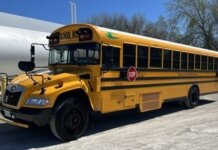In 2020, Hannibal Public Schools in Missouri began researching clean alternative fuels to replace its diesel models that it knew could not meet upcoming emissions standards without costly and complex after treatments.
Cold-weather performance was top of mind for the district because Hannibal averages about three months of below-freezing temperatures annually.
“CNG was an intriguing fuel, but complicated and expensive,” says Scott Speer, transportation director for the district. “And when we crunched the numbers for electric buses, we couldn’t justify the costs. The technology for electric buses hasn’t been around long enough to have case studies for us to learn from.”
Ultimately, district representatives determined that propane-fueled buses would be the best fit, and Hannibal Public Schools received its first round of vehicles in August 2022.
With two winters under its belt, the district is impressed with how well the propane buses perform in freezing temperatures and on hilly terrain.
“We had an unusually cold winter this year, and the cold weather performance of the buses was excellent,” says Speer.
School buses that run on propane autogas provide unaided cold-weather starts to -40°F and don’t require additional components the way that diesel buses do. Additionally, propane buses can run their planned routes in cold weather with no accommodations due to low temperatures. That contrasts with a recent study from the Environmental Protection Agency that found that electric school buses lose about 33% of range when temperatures hit 30°F.

Another big driver for the decision to go with propane was years of data showing the strong financial viability of the buses. Speer found that buses fueled by propane have the lowest total cost of ownership of any fuel – alternative or otherwise.
To help offset up-front and infrastructure costs, district leadership accessed funds from state and federal incentive programs. In addition to funding from the Environmental Protection Agency’s Clean School Bus program, the district received $20,000 from the Missouri Propane Education & Research Council and $10,000 in infrastructure support from its propane supplier, Big River Oil.
Through a two-year contract with Big River Oil, the district is saving 44% in per-gallon fuel costs. The school district is also eligible for the alternative fuel excise credit and alternative fuel infrastructure tax credit.
“Every dollar saved in fuel reallocates to general funds that have gone to raises, particularly to school bus drivers,” says Speer. “We were able to offer a 17 percent pay increase to our drivers, increase the number of transportation staff and invest more funds into our students.”
Hannibal Public Schools’ success with propane school buses has led the district to make the decision to transition to a fleet that runs 100% on propane autogas.
Steve Ahrens has served as the president of the Missouri Education & Research Council for more than 20 years, directing propane outreach, safety training, energy efficiencies and change management. He has worked with many school districts in the state to develop funding programs that support advanced clean transportation buses that help districts reduce costs and emissions. Ahrens previously served with Missouri’s Office of the Secretary of State.
The Missouri Propane Education & Research Council is a not-for-profit organization authorized by the Missouri Legislature. Dedicated to propane education and public awareness, MOPERC provides industry training, consumer safety, appliance rebates and market development programs.







